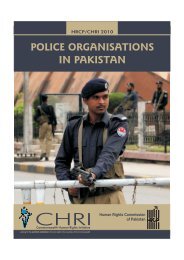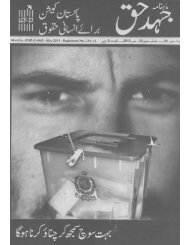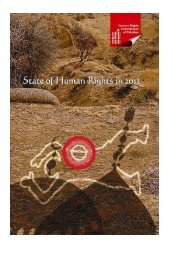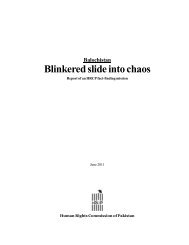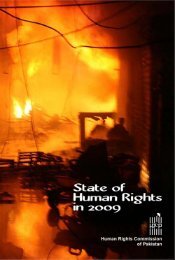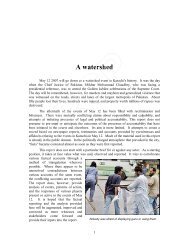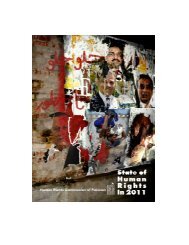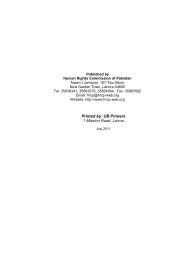Download PDF file - Human Rights Commission of Pakistan
Download PDF file - Human Rights Commission of Pakistan
Download PDF file - Human Rights Commission of Pakistan
- No tags were found...
You also want an ePaper? Increase the reach of your titles
YUMPU automatically turns print PDFs into web optimized ePapers that Google loves.
132Revisiting Police Lawsexists, the political will to implement the laws does not.Mr. Khan also emphasised the importance <strong>of</strong> crime prevention. Previously, the police dealt mainly witharresting those who committed crimes rather than pre-emptively taking steps to ensure the reduction <strong>of</strong> crimescarried out in the first place. Mr. Khosa stated that the IGP will normally release a list <strong>of</strong> most wanted criminals inwhat is known as a ‘black book’ but this is not good enough. There needs to be a permanent record maintained by thepolice in which known criminals are categorized and then pursued. The black book at the IG level would then not berequired. Again, this is a procedure that needs to be enforced at the thaana level as it cannot be handled by the IGP.In closing, the former Chief Secretary Mr. Khan made three important recommendations:1. Interaction <strong>of</strong> the people with the thaana police at the level <strong>of</strong> the village and muhallah(neighbourhood) needs to be regulated and formalised.2. <strong>Human</strong> rights committees could be selectively placed at the police department. If excesses takeplace, voices can be raised.3. Law needs to protect the aggrieved, and the criminal, from violations by the police.Police as victims <strong>of</strong> the current systemDG Khosa discussed some <strong>of</strong> the reasons that have resulted in an indifferent and unpr<strong>of</strong>essional policeforce. He made a comparison between the District police and the Motorway police. The Motorway police is betterpaid and better trained and as a result their morale is high. Since the force is insulated from politics, they stop and fineanyone disobeying motorway rules including ministers. Mr. Khosa emphasised that when the police are given theirdue in the form <strong>of</strong> better pay and health care they perform better. Unfortunately, the police force is also a victim <strong>of</strong>a system where the government’s priorities are led by aims <strong>of</strong> power and greed. As a result, the police force is ill-paid,ill-trained, susceptible to bribes, and constantly subjected to transfers and postings without merit. Political interventionreduces the integrity <strong>of</strong> the police and policing must be kept protected from political influence.Unfortunately, after 2002 the new law was not notified by any provincial government in its original form tillit was amended. Resultantly, the IGP continues to have no security <strong>of</strong> tenure and no control and SHOs are posted onthe whims <strong>of</strong> parliamentarians. Mr. Khosa reaffirmed that to improve the culture <strong>of</strong> stations the SHO should not besubject to the whims <strong>of</strong> the politician. SHOs should be posted by DPOs and the DPOs also need security <strong>of</strong> tenure.Mr. Khosa believes that if the police are provided this autonomy, they will deliver. Mr. Khosa described his frustrationat the lack <strong>of</strong> political will to make change and stated that superintendence is a crucial issue towards bringing reformsin the country and the government must take steps to rectify the status quo soon.DG Khosa states that the creators <strong>of</strong> the Order were idealistic. The Rule <strong>of</strong> law has never been ingrained in<strong>Pakistan</strong>i institutions but the drafters <strong>of</strong> the Order are hoping for eventual acceptance at some stage. The letter <strong>of</strong> thelaw is satisfactory for the purposes <strong>of</strong> reform but it needs to be imbibed in spirit.According to Mr. Khosa a senior police <strong>of</strong>ficer is pitted against:1. His own corrupt lot that he commands. The failure <strong>of</strong> an <strong>of</strong>ficer is seen as a failure <strong>of</strong> the IGP.2. The ruling party in power. The battle for reform is the senior commander’s who must advise theChief Minister that the type <strong>of</strong> policing represented by the Order is in the interest <strong>of</strong> the people.Mr. Khosa strongly feels that eventually it is civil society and the police that will make the change.The Secretary General <strong>of</strong> CRCP, Mr. Abrar Hafeez, asserted that the police also lack technical support andvery basic equipment that is required for the carrying out <strong>of</strong> proper investigation. Technology over time has becomequite cheap and affordable but police still go to the site <strong>of</strong> an incident equipped with ordinary cameras. This shows alack <strong>of</strong> good policy making and investment in the police. It is important to maintain a sensitised approach towards thepolice as they perform their duties under poor working conditions, lack <strong>of</strong> financial motivation and inadequatetraining.Corruption <strong>of</strong> the policeMembers <strong>of</strong> civil society present at the consultation stated that the document (the Order) sounds like an



